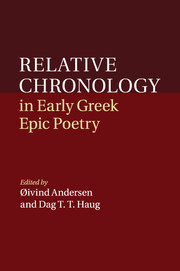Book contents
- Frontmatter
- Contents
- Notes on contributors
- Preface
- Abbreviations
- Introduction
- Chapter 1 πρῶτόν τε καὶ ὕστατον αἰὲν ἀείδειν
- Chapter 2 Relative chronology and an ‘Aeolic phase’ of epic
- Chapter 3 The other view
- Chapter 4 Late features in the speeches of the Iliad
- Chapter 5 Tmesis in the epic tradition
- Chapter 6 The Doloneia revisited
- Chapter 7 Odyssean stratigraphy
- Chapter 8 Older heroes and earlier poems
- Chapter 9 The Catalogue of Women within the Greek epic tradition
- Chapter 10 Intertextuality without text in early Greek epic
- Chapter 11 Perspectives on neoanalysis from the archaic hymns to Demeter
- Chapter 12 The relative chronology of the Homeric Catalogue of Ships and of the lists of heroes and cities within the Catalogue
- Chapter 13 Towards a chronology of early Greek epic
- Bibliography
- General index
- Index locorum
Chapter 7 - Odyssean stratigraphy
Published online by Cambridge University Press: 05 January 2012
- Frontmatter
- Contents
- Notes on contributors
- Preface
- Abbreviations
- Introduction
- Chapter 1 πρῶτόν τε καὶ ὕστατον αἰὲν ἀείδειν
- Chapter 2 Relative chronology and an ‘Aeolic phase’ of epic
- Chapter 3 The other view
- Chapter 4 Late features in the speeches of the Iliad
- Chapter 5 Tmesis in the epic tradition
- Chapter 6 The Doloneia revisited
- Chapter 7 Odyssean stratigraphy
- Chapter 8 Older heroes and earlier poems
- Chapter 9 The Catalogue of Women within the Greek epic tradition
- Chapter 10 Intertextuality without text in early Greek epic
- Chapter 11 Perspectives on neoanalysis from the archaic hymns to Demeter
- Chapter 12 The relative chronology of the Homeric Catalogue of Ships and of the lists of heroes and cities within the Catalogue
- Chapter 13 Towards a chronology of early Greek epic
- Bibliography
- General index
- Index locorum
Summary
Very many of the topics once subsumed under the general heading of the Homeric Question have been completely reformulated, or even abandoned as meaningless, as a result of universal recognition that behind the Homeric epics lies a very long tradition of heroic narrative poetry composed to be heard, not read. Nowadays any attempt to distinguish earlier and more recent strata within the two poems (apart from the two almost certain later additions, Iliad 10 and the end of the Odyssey (23.296–24.548)) will probably be judged old-fashioned. But if we accept that each of the two epics is likely to represent the consummation of its composer's work, the fruits of his experience in telling and revising its various elements, we have to allow that a very long time must have been spent on its creation – years rather than months – and it is not unreasonable to suggest that some parts of the epic may belong to an earlier, some to a later, stage in the poet's development of his theme. Nowadays the preservation of a writer's drafts and working papers sometimes allows us to trace the genesis of lengthy compositions over many years, and we see how the author's conception of his work evolved in the course of time. Such study generally enhances critical appreciation. If we suspect that the Homeric poems may preserve clues to their own development, it cannot be a waste of time to investigate. It must, however, be conceded that the problems encountered in the course of such inquiry do not encourage optimism about establishing relative chronology within the wider environment of early Greek hexameter poetry.
It would be simplistic to suppose that the later books of the Odyssey must necessarily come from the later years of the poet's work. We might indeed suspect the opposite. At the heart of the Odyssey lies the tale of the Husband's Return, a type of story found all over the world and repeatedly gaining fresh life from actual cases; the aftermath of the Second World War brought many tragic instances. In the Odyssey this fertile theme has been enhanced by combination with the motif of a competition between suitors with a bride as the prize. Odysseus’ home lies further from Troy than that of any other Greek hero, and to reach it he had to round Cape Malea, the most southerly point of the Peloponnese and a notorious problem for seamen. So it would not be surprising if it took him longer than any other hero to get home from Troy; but his failure to return a year after Troy's fall would raise the suspicion that he had perished on the way, that Penelope was a widow, and that her remarriage would bring her husband the lordship of Ithaca. But the story told in the epic's latter half does not essentially require the preceding nine years of adventures which for us now seem to typify the Odyssey, the speciosa miracula, Antiphaten Scyllamque et cum Cyclope Charybdin.
- Type
- Chapter
- Information
- Relative Chronology in Early Greek Epic Poetry , pp. 122 - 137Publisher: Cambridge University PressPrint publication year: 2011



